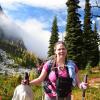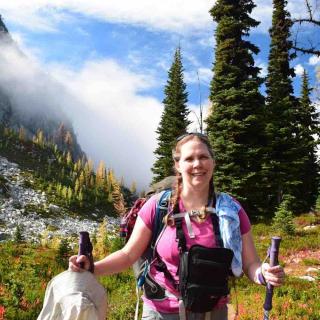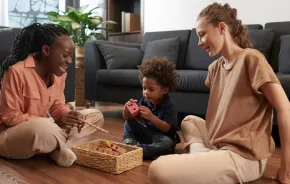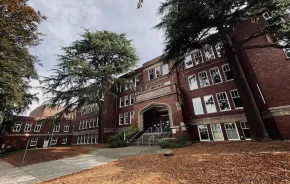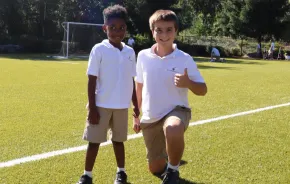
As a writer, photographer and adventurer, Michael Lanza has been all over the world. But one of his greatest adventures involved visiting 12 national parks over a year with his wife and children. Lanza wanted his kids to see our iconic national treasures before climate change altered them too much. This quest ended up as the book Before They’re Gone: A Family’s Year-Long Quest to Explore America’s Most Endangered National Parks, published in 2012, which earned a National Outdoor Book Award honorable mention, among other honors. I was intrigued by the project, and recently asked Lanza some questions about his family’s experience.
What led you to embark on such an ambitious project? How did you decide which parks to focus on?
I had written a feature story for Backpacker magazine about a scientist leading a team in Glacier National Park doing cutting-edge research on the rate at which glaciers there are melting. Their data projected that all of the glaciers in Glacier National Park — perennial ice that's several thousand years old — may be gone by 2020. I thought about the fact that my kids, born in 2000 and 2003, will still be teenagers then. I wanted to take them to see those glaciers in that park that I've hiked and backpacked in, a place that means a lot to me.
As I did more research, I discovered that many national parks face threats from climate change, each very unique to its environment and natural features and wildlife, and that many of these places were already undergoing radical changes and would be very different places within decades. The list of parks I chose to visit was based both on their individual stories of changing climate as well as my personal connection to them.
Do you have any tips for how to talk to children about climate change and its effects?
I was surprised at how interested my kids were in talking about it, even at the ages of 9 and 7 (their ages when I was writing the book and we were doing these trips), and how well they understood the topic. I would tell parents to be completely open with their children and simply present the information at a level of complexity appropriate to their age. And let your kid dictate when and how much you'll talk about it: Broach the subject to gauge interest, but don't lecture — wait for the right time. Kids are curious and willing to learn when their interest is piqued, but as all parents know, kids don't really enjoy getting a lesson in anything from their parents.

How are you able to keep a sense of hope as you contemplate the effects of climate change on our national parks?
Yes, it's challenging. I think it comes down to whether you are an optimist or a pessimist, and I consider myself an optimist. I think humanity has a great capacity to solve its greatest problems, and the moral strength to tackle a challenge of this scale and longevity. I get discouraged seeing companies in the fossil-fuel industries continually trying to block efforts to convert our economy to renewable energy sources; and I get encouraged by the many people and leaders who understand the urgency of doing just that.

What are three or four of your favorite national parks in the Pacific Northwest for families and why?
Certainly one of my family's favorite trips was backpacking on the coast of Olympic National Park. The longest wilderness coastline in the Lower 48, it has a rainforest with giant trees that some scientists believe holds the greatest store of biomass on the planet, and a coast where we saw sea otters, seals, great blue heron and boulders wallpapered with sea anemones, mussels and sea stars.
Rainier is a uniquely beautiful park, and I've long had a love affair with North Cascades because of the ruggedness and remoteness of the mountains there. And although it's not in the Pacific Northwest, Glacier Bay National Park in southeast Alaska is not far away, and paddling sea kayaks there for five days was another favorite family trip.
Watching and hearing a bus-sized block of ice calve explosively from the snout of a glacier a mile across and 300 feet tall, and seeing hundreds of seals or a small rock island covered in sea lions — there are few places like that left on Earth.
At home, we're busy, we're over-connected, and we have too little time together. In the wilderness, we have nothing but one another's company, and it's wonderful.
What advice would you give to families who aren't as into backpacking and paddling as your family, but who still want to experience our national parks?
I think people who've never been to a national park often have the impression of them as daunting wilderness redoubts where they'll be uncomfortable and possibly in some danger. In reality, most national parks have roads, hotels or some kind of lodging nearby, and many natural features that are easily accessible on short, easy walks.
Yellowstone is a great example. We took our kids there for the first time when they were four and two. Many of the park's geysers, waterfalls and other natural features can be seen on very short walks. At Olympic, you can reach the coast on a short, easy hike. At Rainier, you can drive up to Paradise for views of wildflowers and the Mountain.
Any parents can easily do some research and plan and execute a trip of a lifetime that they and their kids will never forget.
 What are some tips you have for dealing with the fickle energy levels and emotions of children while on the trail?
What are some tips you have for dealing with the fickle energy levels and emotions of children while on the trail?
Chocolate and more chocolate. When our kids were younger, we had "halfway candy bars" we each could eat halfway through a hike. We routinely played word games while hiking. One favorite was "The Story Game," where we took turns contributing small pieces of a fictional story, which often took a hilarious twist with each family member's next turn. These games can fill a lot of trail hours.
But I also found my kids really valued simply having a parent's full, undivided attention for hours on the trail. Talk to your kids, see what they want to talk about. My family still has no parallel in "real life" to our time together when we're out in the wilderness. At home, we're busy, we're over-connected and we have too little time together. In the wilderness, we have nothing but one another's company, and it's wonderful.
How did this adventure affect your family and what’s important to you? What did your kids take away from it?
It reinforced my belief in the absolute moral and survival imperative of us, as a nation, making all possible efforts to combat climate change while we have time — for the sake of our children and their children. If we won't do this for our children and our beloved national parks, what else could possibly motivate us?
Our kids unquestionably learned quite a lot both about nature and about climate change — as well as about themselves and their ability to deal with whatever problems confront them in life. I see them now shrugging off the sort of small problems that occur routinely in life, that will send some adults into a panic. I also see our outdoor experiences giving my kids self-confidence and judgment to help them make smart decisions in all aspects of their lives.
More guides to national park adventures
Unplugged fun on the Olympic Peninsula
One dad's guide to Mount Rainier National Park



